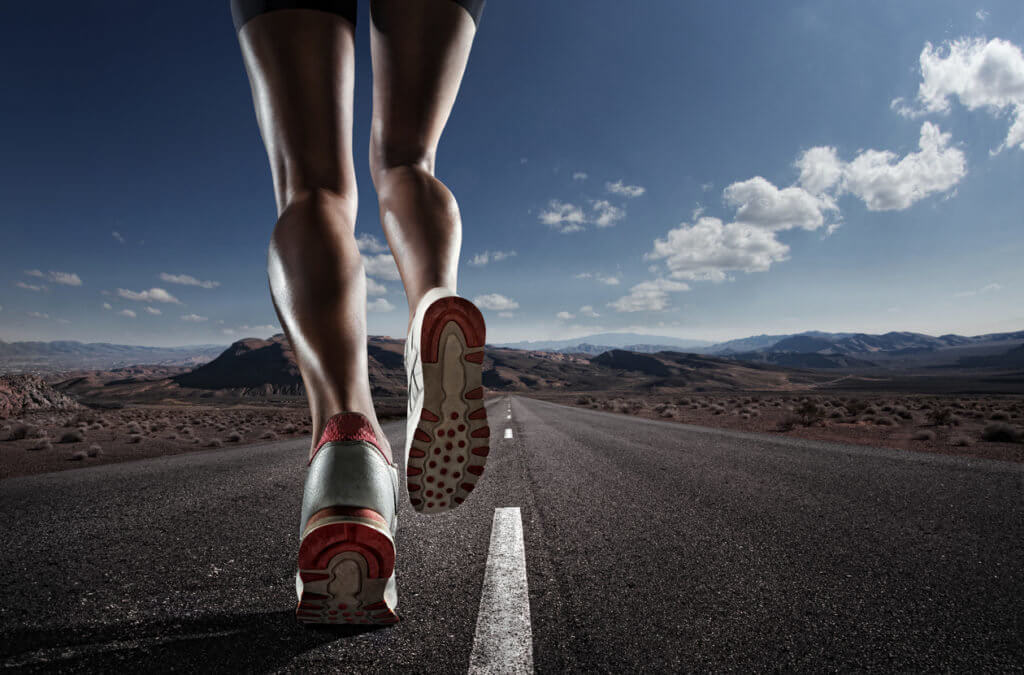How to train for your marathon
Training for a marathon is not to be taken lightly. It is recommended to train for at least two to three months prior to the marathon so you can build up your pace and stamina. In order to avoid the pitfalls of marathon training, here is some advice from experienced marathon runners, physiotherapists and sports massage therapists.
- Build on strength in the legs and core. In addition to your running training programme, we recommend a fitness regime which has been developed to improve balance and coordination and help to build muscle strength in the legs and core. This series of special exercises can be done either indoors or outside to improve your running:
Walking Lunges: working glutes, hamstrings and quads.- Stand upright, feet together, hold two light dumbbells by your sides (palms facing in)
- Take a controlled step forward with your left leg
- Lower hips towards the floor and bend both knees (almost at 90 degree angles). The back knee should come close but never touch the ground. Your front knee should be directly over the ankle and the back knee should be pointing down towards the floor
- Push off the floor with your right foot and bring it forward to starting position. This completes one rep
- Step forward and repeat with the right leg
- Do 3 sets of 20 reps
- Is this your first marathon? Take it seriously. You need to plan your training carefully. Unlike training for shorter distances, unless you’re a very experienced runner, completing a marathon is a huge effort, both physically and mentally. The better prepared you are, the better you will perform on the day. It sounds simple, but the amount of training required to condition the body for a marathon is a major challenge. Be warned, it’s easy to become demotivated and struggle with the time and effort required. If you are new to running, here is some advice on beginners guide to running.
- Marathon Training Plans. A marathon training plan is the first thing that you need to decide on once you’ve signed up for a marathon. Marathon training involves a variety of training techniques, including tempo pace sessions, long runs, hill work and strength training. These are designed to condition your body to cope with the rigours of running 26.2 miles. Find one that suits you and your schedule.
- Cross Training for Marathon Runners: “Don’t just run to get fit, get fit to run,” is the advice of personal trainer Matt Roberts. Your core muscles are an essential part of your running weapons, so while putting the miles in is central to any running training plan, your speed and endurance will improve if you add core and leg strengthening sessions twice a week.
- Fuel your Body Properly: When you’re training for a marathon, you will be burning a lot of calories and depleting your body’s resources, so it’s essential that you refuel correctly.
- Improve Your Running Technique. If you Improve your Stride Length and Frequency, you will be able to run faster and improve your race time.
- Find a Running Partner. Running alone can be an enjoyable experience, but when you’re training for a marathon the long hours, especially when you’re tired or the weather is bad, can begin to wear you down. By finding a running partner with the same goals you can motivate each other and make sure you don’t slip from your schedule.
- Short on Time? If you’re struggling to make time for your marathon training, try a three day a week marathon training advice.
- Don’t Forget to Taper. As the marathon nears, it’s important that you taper your training so that your body is fresh and fully ready to race come the big day. In the two weeks leading up to a race you should be scaling back your training.
- Sports Massage. The strain on your muscles will be significant. Booking in regular sports massage to help maintain their muscles flexibility will help you to continue to train. Many marathon runners and joggers have problems with their iliotibial band, hamstrings and calf complex. Deep soft tissue massage is a great way to combat this.
If you would like to book an appointment for a sports massage or chartered physiotherapist, you can book online using the button below.

